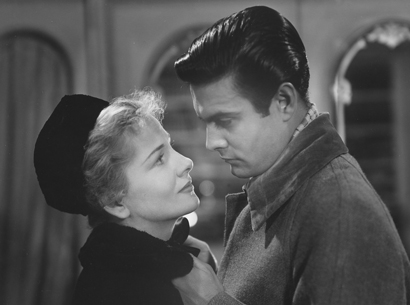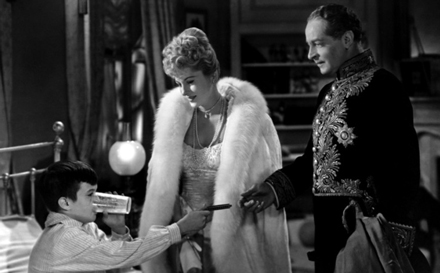
 |
|
|
|
A genuine classic's classic, and a 'women's film' that completely transcends that pigeonhole category, Max Ophuls' Letter from an Unknown Woman is the German filmmakers' American masterpiece. His noir effort Caught gave us the debut of Barbara Bel Geddes but fell victim to last-minute reshoots. Ophuls' The Reckless Moment is a superior domestic noir with Joan Bennett. But Unknown Woman goes another route with what might at first seem a star vehicle for the innocent-in-distress Joan Fontaine. Having played romance-struck teenagers with great success, Fontaine reveals the truth behind romance as an obsessive engine of self-destruction. Letter from an Unknown Woman is at once a merciless heart-tugger -- and also a dispassionate reminder of the folly of unrestrained romantic delusions. 
In Old Vienna the once-promising concert pianist Stefan Brand returns home, supposedly to prepare for a duel scheduled for dawn, probably a challenge by the husband of a lover. As Stefan is a lifelong womanizer and narcissist bar none, he has no intention of keeping the appointment and asks his mute valet John (Art Smith) to pack his bags. But first he reads a letter from a woman who at first doesn't identify herself: Much of the story plays out in the past. Scarcely a teenager, Lisa Berndle (Joan Fontaine) falls in love with a pianist, Stefan (Louis Jourdan) who lives her apartment building. Rhapsodizing over an imagined life with her prince, Lisa is crestfallen when her mother remarries and takes her away to a provincial garrison town. A few years later a young officer proposes marriage, but Lisa breaks it off -- and severs her family ties -- with the lie that she's already secretly engaged. Working as model in Vienna, she contrives to reunite with Stefan, who does not remember her. They have a one-night romance, after which Stefan disappears. Lisa bears a son, Stefan Jr. (Leo B. Pessin) in hiding. Seven or eight years beyond that, Lisa has married the wealthy Johann Stauffer (Marcel Journet), who showers her with comforts and lovingly cares for her son. But Lisa avoids answering the question of whether or not she loves Johann. Seeing Stefan again at the opera, she throws her marriage away to be with him one more time. The story continues, but revealing more would not be appropriate. Most of Unknown Woman is a visualization of Lisa's long letter, delivered to a man who doesn't even remember her, yet was the love of her life and the focus of her every major life decision. An American movie filmed in Hollywood, Woman is so European in appearance that we forget that its actors are speaking English. Are those the 'Frankenstein town' sets that Lisa's family stroll through on the way to church? Max Ophuls would soon return to France and a brief series of masterpieces about complex women and destructive romances -- La Ronde, The Earrings of Madame De..., Le Plaisir, and finally Lola Montés. This independent production released by Universal, belongs with that series. Letter from an Unknown Woman is memorable because it takes the 'romantic coming of age' fantasy to its logical extreme. Joan Fontaine has played the sweet young woman or girl before -- a sheltered companion who marries a Byronic mystery man; an orphan who marries another Byronic mystery man; an orphan who inspires a budding composer; a sheltered country girl who feels insecure married to an irresponsible dreamer. In each case the young woman is sensible, vulnerable and courageous, and in most cases her virtue is rewarded with a prince charming. This time around the premise is more realistic. Lisa keeps her romantic dreams to herself, always. Unlike other little girls, she doesn't let go of her childhood obsession, but instead abandons her predetermined path -- marriage, children, respectability -- to pursue her dreams. As if believing in fairy tales she waits to be 're-discovered' by Stefan Brand. It doesn't matter that he obviously has dozens of woman, and doesn't even remember her. As far as Lisa is concerned he's hers. She throws her life away for two nights of love, separated by years. She's unbalanced, mad, self-destructively insane. Unknown Woman is not a surrealist film, but Lisa is a surreal heroine, denying reality for her own obsessive pursuits. 
So what we've got here is a standard woman's fantasy with a sting in the tail. Virtuous princess types that stick to their romantic dreams win out in the movies, but almost nowhere else. Unknown Woman brings into question the whole idea of 'living for love', following one's heart, etc. Lisa is a dreamer but the world is real and the price it exacts for breaking its rules is terrible. As the film progresses, Lisa's focus on Stefan Brand becomes less and less attractive. She waits and suffers, and simply makes herself available when he flits in and out of her life. She's sufficiently interesting to make Stefan modify his standard seduction dialogues, but not so fascinating that he can be distracted from his other pursuits. Even as Stefan gives makes his 'everlasting love' promises at the railway station, we hear a female voice from the train, urging him to hurry and join her. Lisa is so far gone that she throws away the love of a man who adores her and places her son's future in jeopardy, to indulge her fantasy for a man who can't even remember their one-night affair. We all make mistakes and we all remember a person or persons in the past that we didn't 'do right by', for any number of understandable or shameful reasons. One's first reaction watching Unknown Woman is to despise Stefan Brand, the consummate narcissist apparently so sated by his love life that he neglects his career as a concert pianist. Even though Stefan sentences himself harshly at the end, after reading Lisa's letter (no spoilers here), he's a known quantity. Were Lisa operating outside of a cloud of romantic pixie dust, she would have sorted him out very soon, and rejected him or remained friends with him. As it is she condemns herself. Stefan Jr. pays a high price for mother's romantic notions, but I mostly feel sorry for her husband Johann, whose adoration is rewarded with polite indifference. When Johann asks if she perhaps loves him, Lisa responds (para.) "With all the things you give me I'd be a fool not to." That's not much of a yes. This is one movie in which the suffering heroine courts misfortune all on her own. We can imagine Johann's profound disappointment, having a James Joyce "The Dead" moment when he sees Lisa show up at Stefan's door, a bouquet of flowers in her hand. It was always Stefan, never Johann. Yet Ophuls brings in a random fate to resolve Lisa's quest for romantic nirvana. The worst happens, and like everything else that occurs she faces it alone. It's fascinating that her 'letter' (the movie we see) does not criticize or judge Lisa. We're forced to figure out her puzzle on our own. Without the letter, nobody in the story would have a clue as to what she was all about. 
Ophul's film has a different rhythm than a Hollywood product of 1948, to be sure. Only in retrospect do we realize that Lisa has condensed a life's loving relationship with Stefan into one night. They meet, and she decides to remain anonymous. He takes her to eat and to a fun fair closed for the winter. Is that the giant The Third Man Ferris Wheel in the background? One scene is always mentioned in studies of Ophuls. Stefan takes Lisa on an antiquated version of a theme park ride, a private coach in an indoor room. Painted backgrounds of various European capitols roll by on large canvas backdrops, pulled by a man working foot pedals on an elaborate mechanism. The couple takes a 'world tour' in a private coach clearly meant for necking. Ever the suave seducer, Stefan is building up to taking Lisa back home, to finish their date in the early morning hours. It's all she could ever dream of, packed into one night. He's charming, she beams, and the whole situation is soaked in glamorous tragedy. For his American movies Max Ophuls name was shortened to "Opuls", which always looked like an egregious typo. Maybe the publicity people feared that it would read to Americans as "Awfuls". Louis Jourdan's pitch-perfect performance redeemed his American debut in the ill-fated The Paradine Case of the previous year. After seeing Unknown Woman he comes off as a hand-kissing cad in all of his roles, even the light musical Gigi. Unheralded in the cast is Art Smith, a treasured actor that came straight from the socially conscious theater scene. Smith's film career of impressive supporting roles was stopped cold when his old friend and associate Elia Kazan named him while performing as a friendly witness to the HUAC committee. Smith continued on stage, and was in the original cast of the musical West Side Story. Olive Films' Blu-ray of Letter from an Unknown Woman gives us a chance to see this impressive movie in a near perfect copy. The only flaw I noticed is a slight unsteadiness in the title sequence, surely due to slightly shrunken elements. The picture has some patches of light speckles as well but otherwise is far, far better looking than any copy I've seen. Daniele Amphiteatrof's music score captures a precise 'Viennese' flavor. 1 As there are no extras, some reading on Max Ophuls is a good idea. He's a pretty amazing filmmaker and his European '50s films are packed with impressive technical-artistic accomplishments. I'll have to wait, I guess, to see the '30s classics that made his first reputation: Liebelei, La Signora de Tutti, La Tendre Ennemie. I'm told that some are comedies, where the heroine doesn't suffer too terribly.
On a scale of Excellent, Good, Fair, and Poor,
Letter from an Unknown Woman Blu-ray rates:
Footnote:
1. It happens to us too! My particular copy of Unknown Woman stopped playing about ten minutes from the end. As I know the film well, finishing the review was not a problem. I get discs with issues -- smears that need to be buffed out, glue than needs to be removed -- but this is the first time I could see an actual tiny chip in the surface of the disc. My luck with these things has usually been far better -- in thirteen years I think I've gotten ten discs that didn't play. Hazards of life in the big city.
Reviews on the Savant main site have additional credits information and are often updated and annotated with reader input and graphics. Also, don't forget the 2011 Savant Wish List. T'was Ever Thus.
Review Staff | About DVD Talk | Newsletter Subscribe | Join DVD Talk Forum |
| ||||||||||||||||||